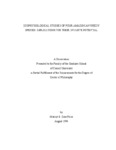Use este identificador para citar ou linkar para este item:
http://www.alice.cnptia.embrapa.br/alice/handle/doc/402604| Título: | Ecophysiological studies of four amazonian weedy species: implications for their invasive potential. |
| Autoria: | DIAS FILHO, M. B.  |
| Afiliação: | MOACYR BERNARDINO DIAS FILHO, CPATU. |
| Ano de publicação: | 1994 |
| Referência: | 1994. |
| Páginas: | 220 f. |
| Conteúdo: | This research focused on a comparative study of four important perenial weedy species from pastures and crop areas in eastern Brazilian Amazonia: Ipomoea asarifolia (Desr.) Roem. & Schultz (Convolvulaceae), Stachytarpheta cayennensis (Rich) Vahl. (Verbenaceae), Solanum crinitum Lam. (Solanaceae) and Vismia guianensis (Aubl.) Choisy (Guttiferae). Two major lines of experiments were conducted. The firts investigated some aspects of the seed ecology of the species: longevity in the soil, germination responses to light, nitrate and osmotic stress and the effect of planting depth on seedling emergence. The second line of experiments evaluated the effect of limited soil moisture or of contrasting light environments on physiological and morphological responses of thespecies. In addition, the effect of a simulated mowing regime on the fecundity of S. cayennensis was evaluated. The results from this research have identified ecophysiological characteristics which indicate that all four species studied are equiped with traits that can render them noxious weedy species in tropical regions. However, based on the environmental and management conditions known to exist in cultivated pastures and certain crop areas in eastern Brazilian Amazonia, the potential of these species to become persistent weeds and extend their ranges could be tentatively classified in the following sequence: Stachytapheta > Vismia > Solanum > Ipomoea. |
| Thesagro: | Erva Daninha Vismia Guianensis |
| NAL Thesaurus: | Amazonia Solanum crinitum ecophysiology |
| Palavras-chave: | Ecofisiologia Brasil Ipanema asarifolia Stachytarpheta coyenannensis Weed |
| Notas: | Dissertation (Doctor of Philosophy) - Cornell University, Cornell. |
| Tipo do material: | Teses |
| Acesso: | openAccess |
| Aparece nas coleções: | Tese/dissertação (CPATU)  |
Arquivos associados a este item:
| Arquivo | Descrição | Tamanho | Formato | |
|---|---|---|---|---|
| MoacyrDiasFilhoPhDThesis.pdf | 580,69 kB | Adobe PDF |  Visualizar/Abrir |









